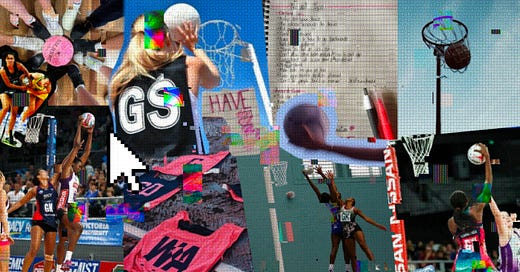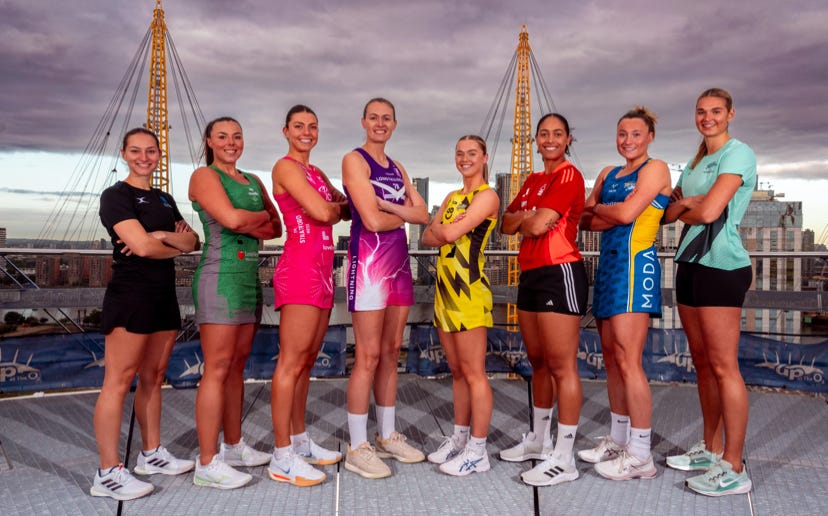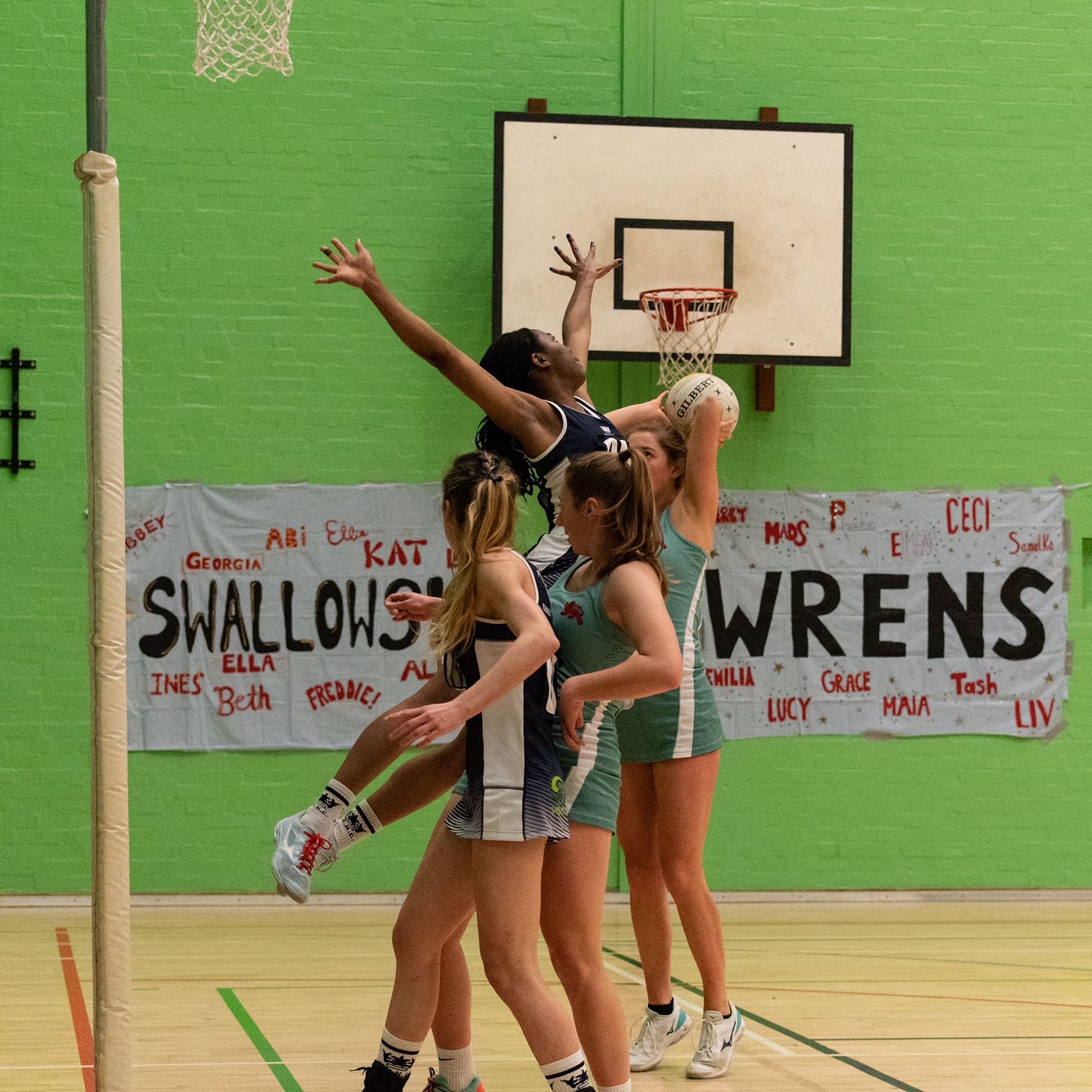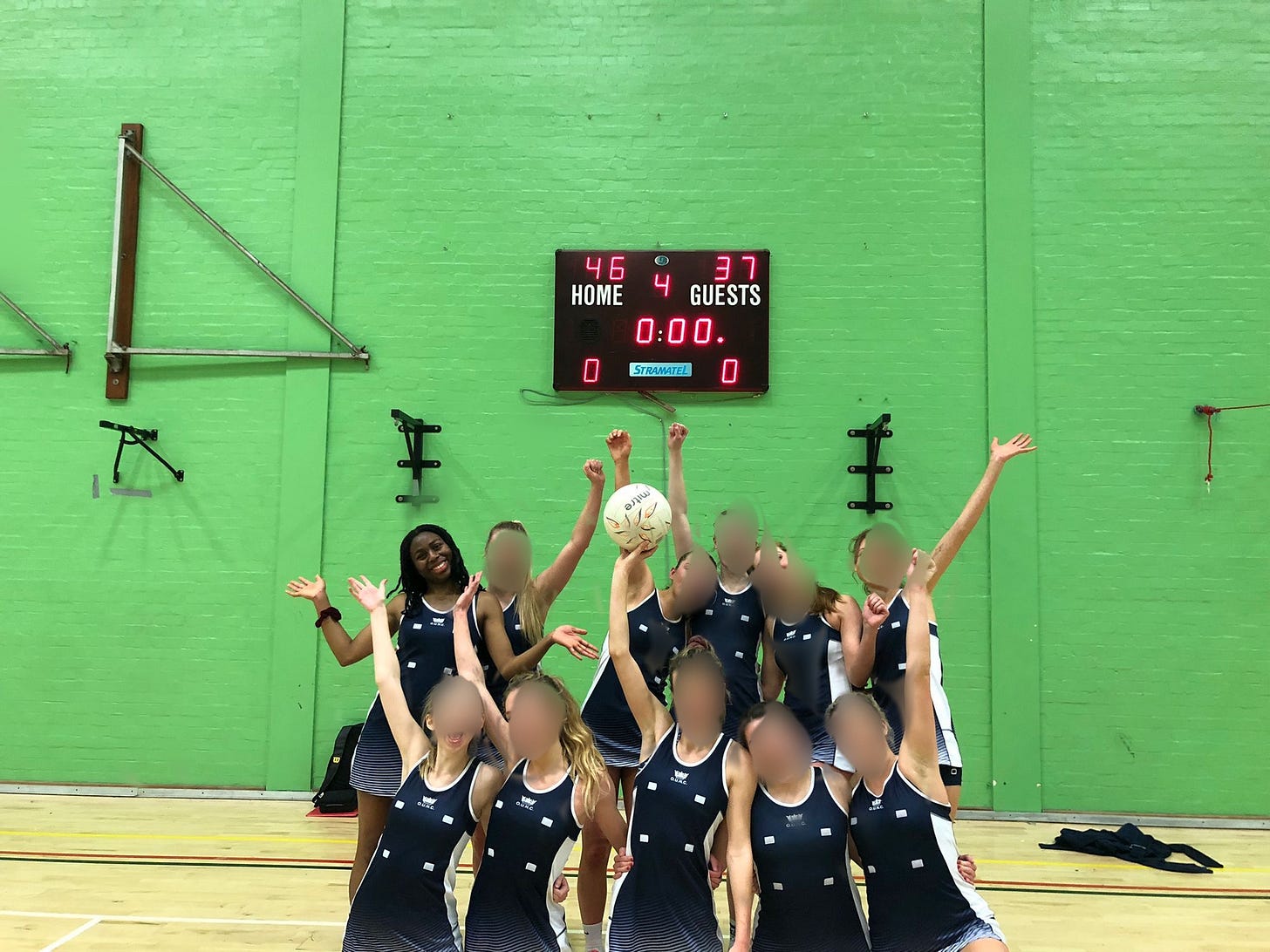Are netball girls actually jarring? or are we all just being misogynistic.
In defence of netball girls
I am eighteen years old and shivering in a changing room. Last night’s mascara clings to my under eyes despite having just spent 60 minutes in the pouring rain playing what should be an indoor sport.
“Uh, wing attack? yeah don’t bother coming to dev squad trials” a sharp voice cuts through the room. I reach for my energy drink and shake my head. I feel vindicated as I ring my mum on the walk home, I knew fresher's netball would be a bad idea.
On university campuses around the UK, girls who play netball get a bad reputation. Memes on the subject proliferate, proving the preconceptions. According to the internet, Netball Girls are haughty and mean. These stereotypes seem to originate on the courts of school P.E lessons, whispered judgements creating prejudices which linger even as adolescence melts into adulthood.
Saturday 8 March marked the Netball Super Cup ahead of the relaunch of the Netball Super League (NSL), England’s top flight women’s netball league. With its format reimagined in order to professionalise the sport in the UK, the league will see eight teams compete in arenas around the country, receiving an unprecedented amount of broadcast coverage as they do so.
The league aims to make netball a viable career pathway for athletes who wish to pursue it and is the foundation in England Netball’s plan to create a league which rivals the success of Australia’s Suncorp Super Netball League, a fully professional competition which has paved the way for elite netball since its 2016 inception. It's a worthy if not overdue endeavour given that netball remains the most popular team sport played by women in the UK.
But new attention on the game unearths old biases towards both netball and its players. For years, the sport has been belittled by the court of public opinion; dismissed by some as unathletic. This discourse has been spurred on by the fact that netball is excluded from major tournaments like the Olympics and is one of few elite sports played exclusively by women. Research has shown that hobbies enjoyed by women are subjected to increased ridicule and scrutiny whilst the middle class, all-girls school contexts which form many people’s introduction to netball further fuel the exclusionary stereotypes surrounding netball players.
The game we think we know is changing and as it enters a new era, we must change with it so HGWS is asking, where do the stereotypes surrounding netball girls come from? And is it time they got an update?
“Netball celebrates a relatively narrow, heteronormative, feminine athletic ideal”
Research conducted by Dr Amy Marfell reveals how, unlike other sports such as rugby and football, whose masculine connotations problematise women’s involvement, netball is one of few sports overtly associated with women and so, it offers refuge for girls and women seeking to play without falling victim to gender policing and other negative social backlash.
According to Marfell, netball celebrates a ‘relatively narrow, heteronormative, feminine athletic ideal’, bestowing coveted social status on girls who choose to play. ‘Girly’ girls play netball. It isn’t hard then, to understand why so many adolescent girls opted for netball over other sports during a life stage where fitting in assured survival.
Simply put, netball is one of few sports that allows girls and women to play without being either compared or likened to men and it is within this insulating bubble that many are first able to reap the benefits of team sport.
Marfell’s research reveals the truth behind the pretty, popular netball girl stereotype; an image which has led some women to feel excluded from the sport. And although the trope of the swishy netball (C)aptain makes easy fodder for reminiscing about awkward PE lessons gone by, netball’s girly vibes have helped to legitimise women’s participation within sports at times where female inclusion was discouraged.
The recent growth of women’s football and rugby in the UK has highlighted disparities faced by sportswomen, nevertheless the success of the Lionesses and Red Roses has offered aspiring young athletes a light at the end of an arduous tunnel in the battle to play professionally. Until this season, aspiring British netballers wanting to ply their trade could only aspire to playing on the world stage as an England international or else making the move abroad.
Casual participation in netball is at an all time high with almost 3000 netball clubs in operation, nurturing young talent and providing a route for players at all life stages to enjoy the sport at grassroots. It was through local teams that Ebube Akojie, 22, first found her love for netball. Scouted for her natural ability, Ebube went on to join England Netball’s youth development pathway and played under 17s and under 21s with NSL teams London Pulse and Surrey Storm.
“My involvement in netball just kept growing until I was training six days a week and playing for NSL academy, school, local club and county. It was intense.” Ebube shares. She describes evenings spent undertaking the four hour round trip from her home in Surrey to Queen Elizabeth Olympic Park in East London in order to attend training sessions.
“I’m grateful for netball, it got me a scholarship to a good school and gave me so many friends and, don’t get me wrong, I definitely could have trained harder and been more dedicated but it never felt like something that I was going to do seriously.”
“I wanted a secure career and that didn’t feel like something netball could bring me, even if I were to go on and play at senior international level, so I prioritised my education and stopped playing to focus on A-Levels.”
Ebube playing netball.
Before reprising the sport at university, Ebube joined the 64% of girls who quit sport by the age of 17 and her story highlights the decisive issue the reimagined NSL seeks to address, without a clear professional pathway in netball, how many more young girls left the sport never to return?
When the NSL tips off on Friday 14 March, several athletes competing will do so whilst balancing full-time work or studying. The long term aim of the league however, is to provide wages substantial enough to allow athletes to train and compete professionally.
Though a perceived lack of professionalisation was enough of a deterrent to steer Ebube away from netball, she shares that this isn’t true in all cases, “I had teammates who sacrificed spots at top unis to go to lower ranked schools with better training facilities, they were determined to find a path to the top.”
“I think the push for professionalisation with the league relaunch could make it easier for future athletes to play without having to make those sacrifices.”
Ebube and teammates.
New attention on the NSL is also sparking new love for the sport amongst lapsed players.
Ally Tomlinson made her return to the court in 2021. She describes having previously avoided the sport due to preconceptions about netball players.
“I never joined at university because, looking at the team, I didn’t feel as though I ‘fitted’ in. Now, it is such a big part of my life. I started playing again because I was incredibly lonely. I’d moved 250 miles away from home, been through an 8 year breakup, started a new job and I hadn’t been able to make any friends due to lockdown.”
“I didn’t have any team sport history and all I could think was, at least I know the rules of netball, that’s a start. So I googled it and found a local team and signed up. It was the best decision I have ever made. I’m on three different teams and my entire week revolves around practice and matches and I wouldn’t have it any other way, unless it’s raining!”, Ally jokes.
The benefits of netball on Ally’s life have been profound and she shares her hope that increased publicity around the NSL will lead the sport to gaining increased respect and recognition.
Ally attending the NSL Super Cup
“I don’t think netball and netballers receive the respect that they should. I think a lot of it comes down to the fact that netball is classed as a ‘girl’s’ sport and suffers as a result of the societal view that girls are not athletes, are not strong, and are not powerful. But if you ever actually watch a game of netball or sit and engage with the NSL, it's incredibly fast and competitive. It’s empowering to watch.”
“Things are changing now with people at the top putting effort into making the sport a business as well as a recreational activity and I am genuinely so excited to see it grow and blow those preconceptions about a female dominated sport out the water.”
As the dawn of a new era of netball creeps closer, it offers the hope of ushering in new perceptions about the sport and bringing about opportunities for those hoping to play at the elite level. We are entering a netball girl era, where fewer athletes aiming for the top will be forced to pivot away from the sport in pursuit of other careers.
And while painful memories of being sniggered at in school changing rooms may remain, we may be moving to a place where netball girls are known solely for their athleticism and skill.
As Ally puts it, “I think we were all told that girls who like netball don’t have - power, strength, skill or team spirit. And that’s why we show up each week to prove those stereotypes wrong - even if it’s raining.”









